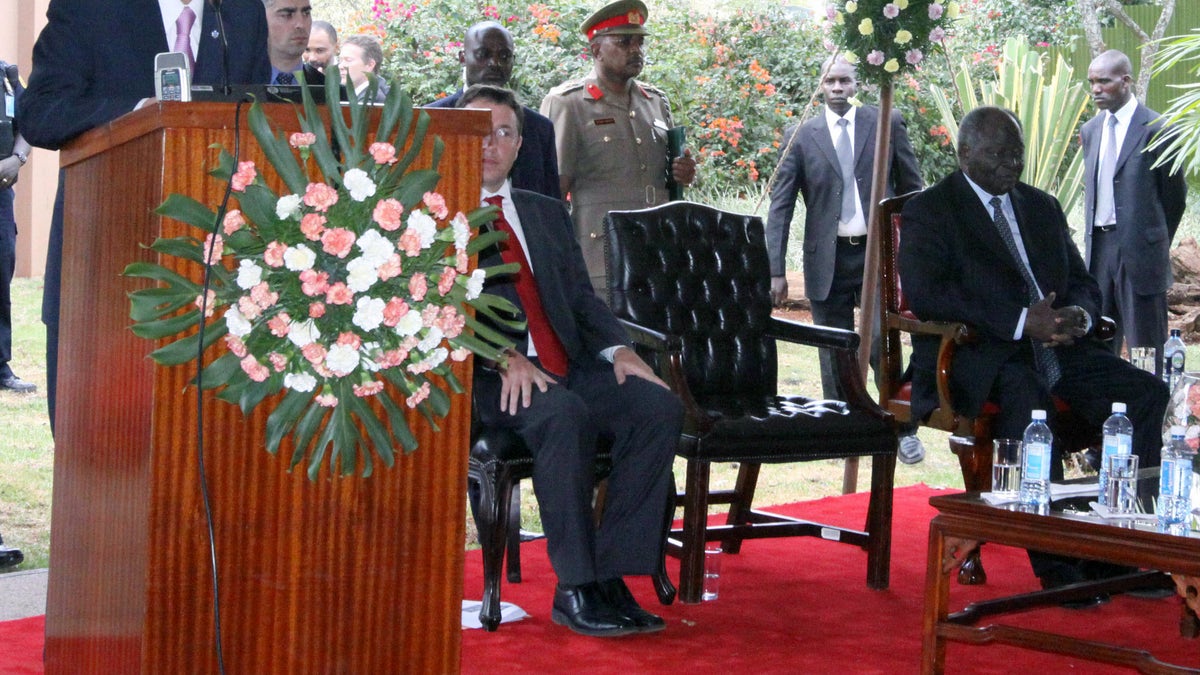
United Nations Secretary-General, Ban Ki-moon, left, and Kenyan President Mwai Kibaki, right, seen at the United Nations building in Nairobi, Kenya, Thursday, March 31 2011, where Ban Ki-moon officially opened the new offices of the United Nations Environment Programme (UNEP) and the UN Human Settlements Programme (UN-HABITAT) .
Top executives of the United Nations, facing a looming financial crisis caused by their ever-expanding agenda, have come up with some less-than-radical ideas about how to save money --including telling more U.N. staffers they have to fly coach.
From the New York-based Secretariat to such little-known outfits as the International Civil Aviation Authority, managers of various U.N. agencies have tossed out cost-saving ideas like a hiring freeze and actual, if unspecified, reductions in the U.N.’s dense array of upper-middle managers and their support staff.
Other suggestions seemed highly unlikely to be accomplished in a short time, if at all, including the notion of new mergers within the sprawling bureaucracy to “form more coherent and strengthened entities” in the name of efficiency.
A copy of the suggested quick-fix changes was obtained by Fox News. They were considered by the CEOs of 28 U.N. agencies at a two-day closed door meeting in Nairobi, which ended April 2. How many of the suggestions were actually adopted is not known.
Click here to view the list of suggested cutbacks.
The Nairobi meeting of the U.N.’s Chief Executives Board for Coordination (CEB), which brings together the heads of 28 U.N. organizations worldwide under the chairmanship of U.N. Secretary General Ban Ki-moon, was focused on belt-tightening because the top bosses face the likelihood that many of the wealthy nations that provide most of their cash are likely to cut back soon.
The government of Britain was the first to deliver that message last month, when its ministry for international development announced it would cut off four minor U.N. organizations entirely from funding at the end of next year, and put others on warning that they would face the same fate if they did not improve performance. Other generous U.N. funders, like Norway, have started financial reviews that could lead to similar results.
Then there is Japan, which faces huge and still escalating costs for recovery from its treble disaster of earthquakes, tsunami and damaged nuclear reactors. Japan is the second largest donor, after the U.S., for the U.N. Secretariat budget, and pays generously for a wide variety of other U.N. agencies.
One country that has not yet taken the austerity approach is the U.S., which provides at least $6.4 billion for the U.N., according to U.S. government compilations.
What most of the suggestions sent to the Nairobi meeting reveal is that despite years of a widely-touted effort to “deliver as one” united organization in its humanitarian and other efforts, the U.N. is still a widely disparate array of uncoordinated bureaucracies, ranging from such giants as the United Nations Development Program (UNDP) and the World Food Program, to such relative backwaters as the International Labor Organization and the International Maritime Organization.
They do not use the same rules and procedures for buying goods and services, often fail to use modernized record keeping, and have not harmonized such sensitive -- and possibly money-saving -- activities as how they manage their cash.
In an organization that spends an estimated $1.1 billion annually on travel, many of the suggestions provided to the Nairobi meeting sound embarrassingly rudimentary: “taking advantage of restricted fares,” for example, and “reduced late booking travel.”
Among other things, the top executives were given suggestions that they could cut the U.N.’s $3 billion procurement bill by creating joint logistics services and centralizing their communications technology across agency lines.
They also call for “intensification of audits of operations at country, regional and global level,” which would reinforce “the sense of fiscal discipline, responsibility and cost consciousness.” The suggestion does not note, though another systemwide U.N. study does, that U.N. auditors are already over-stretched, under-qualified for their work, and often impeded and ignored by their bosses.
Click here to read that story from Foxnews.com.
None of the ideas presented to the Nairobi meeting included a drastic change in the ramshackle way the U.N. system itself has grown in the past six decades. Notably, nothing in the suggestions addresses the inefficiency of having 28 international funds, agencies, programs, regulatory agencies and other major global bureaucracies in the first place, many with overlapping and competing mandates for their activities, especially in such rapidly expanding areas as environmentalism.
Click here to read more on that story from FoxNews.com.
Changes in that overall bureaucratic challenge likely are beyond the pay-grades of even the top-most U.N. executives -- not to mention, perhaps that the changes might not be in their personal or bureaucratic interest.
George Russell is executive editor of Fox News.
